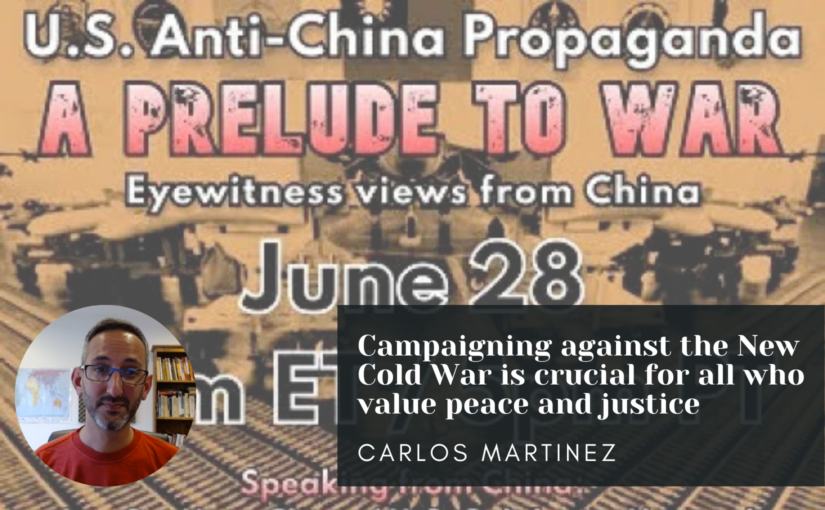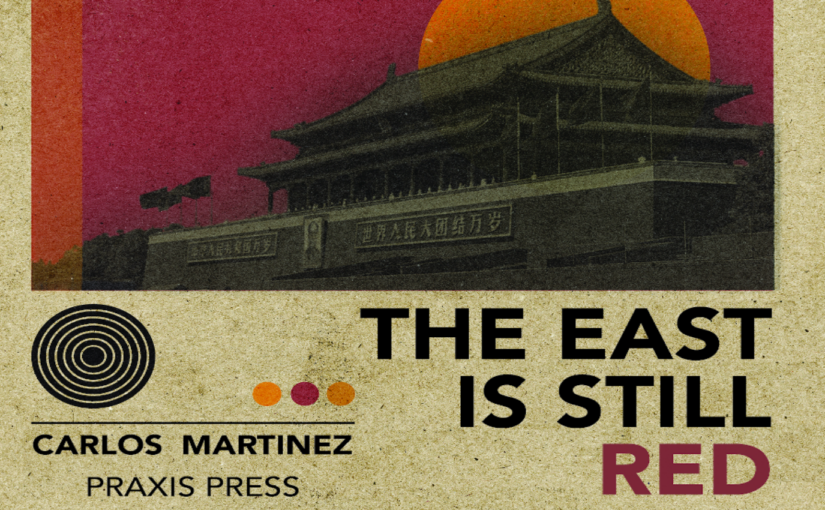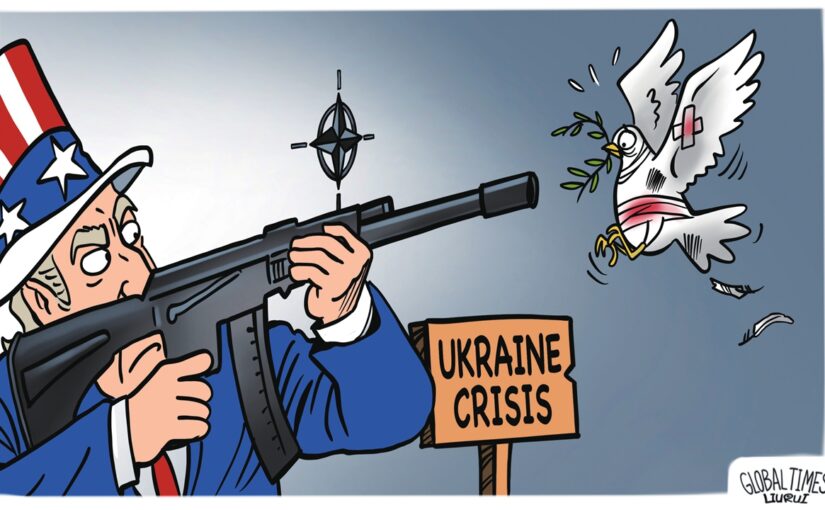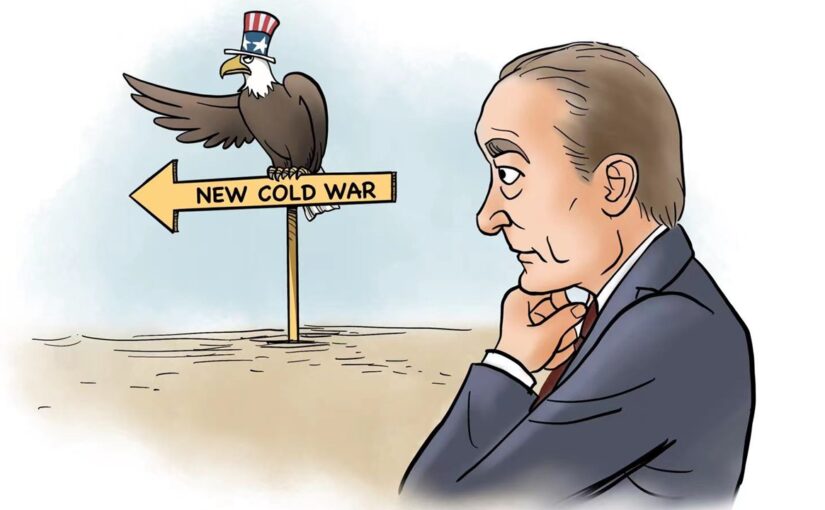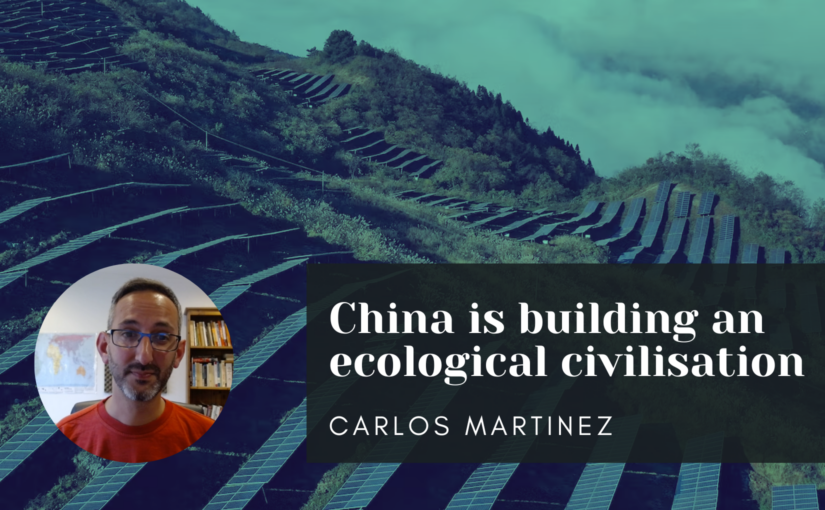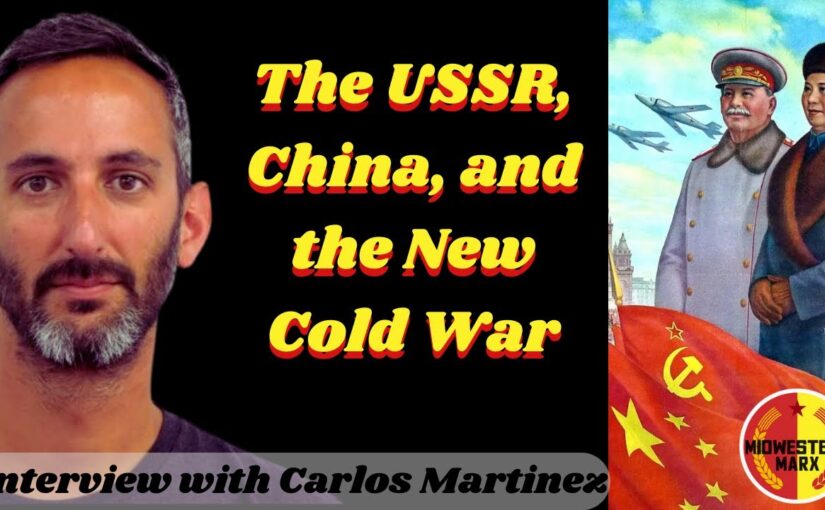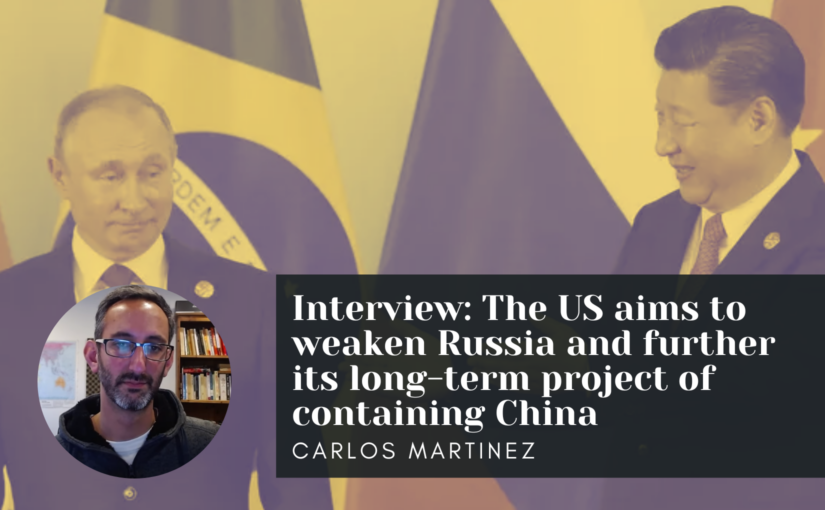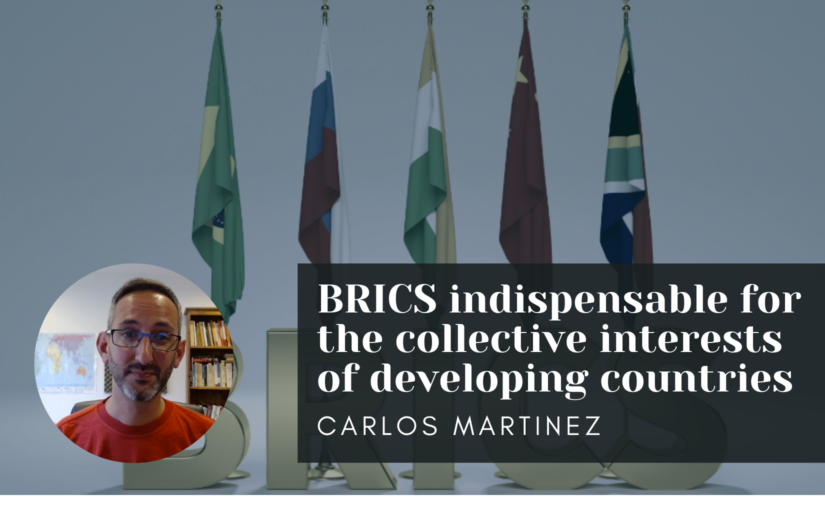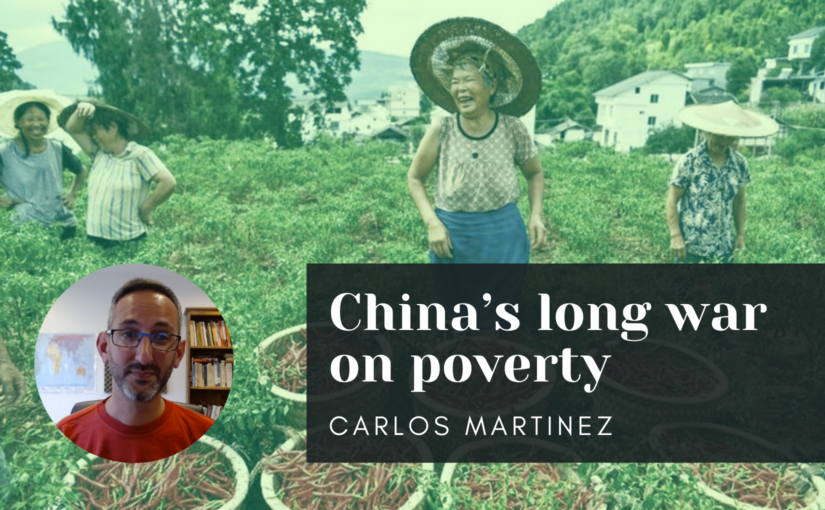This is the text and video of a presentation made by Carlos Martinez at a 28 June webinar of the United National Anti-War Coalition, on the theme of US anti-China propaganda, a prelude to war. Carlos exposes the extraordinary hypocrisy and falsehood of the propaganda war that the Western powers are waging against China, and highlights how it is being leveraged to shift public opinion in favour of anti-China hostility.
He points out that the escalating campaign of China encirclement and containment is threatening to derail global progress on key issues, noting that “the future of humanity actually hinges on global cooperation to address our collective problems.” As such, Carlos calls on all progressive and peace-loving people to make campaigning against the New Cold War a core part of their work.
Other speakers at the event included Lee Siu Hin of the China-US Solidarity Network, Sara Flounders of the International Action Center, and Arjae Red of Workers World Party. The full webinar can be viewed on YouTube.
Dear friends, thank you so much for inviting me to speak at this important event. I’m very sorry not to be able to join you in person, as I’m currently in Guiyang, China, on a delegation.
The theme of today’s event, “Anti-Chinese propaganda, a prelude to war”, is closely connected to the rationale for writing my book, “The East is Still Red: Chinese socialism in the 21st century.”
I had two key aims in mind with the book.
One was to talk about socialism, about how China is a socialist country. So many people think that China used to be a socialist country and then became capitalist with the introduction of market reforms. I wanted to show that China remains a socialist country and that socialism provides the framework for its incredible successes in poverty alleviation, development, renewable energy, and so on.
And I wanted to say to the Western left – which tends to be a bit unsure about China – look, China’s achieved all these things, it’s raised living standards beyond recognition, it’s gone from being a technologically backward and oppressed country to being a science and tech powerhouse, it’s leading the global shift to multipolarity; why on earth would we want to ascribe these successes to capitalism rather than socialism? Let’s celebrate socialist victories, let’s uphold the history and politics of the global working class.
Hence ‘The East is Still Red’.
The second key aim in writing the book was to stand up to the propaganda war, which is part of a wider New Cold War against China, and that’s the focus of my talk today.
This work of standing up to the propaganda war is urgent. It needs to be a major focus for socialists, communists, progressives, for anti-war campaigners worldwide; really for anyone that doesn’t think “better dead than red” is a viable slogan for the 21st century.
Because the propaganda war is war propaganda.
It seeks to build the broadest possible public support for a New Cold War, for a campaign of containment and encirclement, and ultimately very possibly for a hot war.
Let’s get something straight. This New Cold War, this anti-China campaign, has absolutely nothing to do with human rights.
When the West throws disgraceful slanders at China over alleged human rights abuses in Xinjiang, does anybody seriously think they’re manifesting a hitherto secret fondness and respect for Muslim people and their religion?
Where was that sentiment when they killed over a million people in Iraq?
Where was that sentiment when they destroyed Afghanistan, turning a quarter of its population into refugees and imposing brutal poverty on the rest?
Where was that sentiment when they bombed Libya into the Stone Age?
Where’s that sentiment today as they wage a disastrous proxy war against Iran in Yemen, creating the most severe humanitarian crisis in the world?
If they’re concerned about Muslims being placed in prison camps and denied their human rights, the first place they need to look is their illegally occupied corner of Cuba, that is, Guantanamo Bay.
When the West spreads outright lies about the suppression of Tibetan or Inner Mongolian language and culture, does anyone seriously think they’re standing up for the rights of indigenous peoples and for the preservation of precious human history?
How many indigenous languages are taught in US schools? To what extent is indigenous culture – and righteous resistance against colonialism – celebrated in US society? When was the last time native rights were upheld over drilling rights? Why does the US Congress seem more concerned with preserving Tibetan heritage than shutting down the Dakota Access pipeline?
These anti-China stories – all of which can be and have been comprehensively debunked – have nothing to do with upholding the principles of freedom, democracy and justice.
Those are the principles that are invoked. Those are the sentiments that are manipulated. Do you support freedom for Tibetan people? Do you oppose genocide and cultural genocide? Do you oppose debt traps in Africa and Latin America? If so, you should be anti-China, that’s the message; that’s the way of manufacturing consent, of persuading people to take a reactionary pro-imperialist position whilst feeling like they’re standing on the side of justice.
But it’s not the side of justice. It’s a campaign of demonisation, forming part of a hybrid war against socialism, against sovereignty, and against multipolarity.
It’s part of the New Cold War, part of the Project for a New American Century. There’s nothing progressive about it. It’s the politics of Donald Trump, of Joe Biden, of Mike Pompeo, Paul Wolfowitz, Donald Rumsfeld.
It’s the politics of a decaying US-led empire doing everything it can to prevent that decay, to maintain its hegemony, to prevent the emergence of a different kind of world.
In that sense, the New Cold War actually has a lot in common with the original Cold War.
What was the Cold War about? Historians sometimes talk about it in grandiose terms, as a “clash of civilisations”; an ideological battle between capitalism and communism, ending with the triumph of so-called liberal democracy and the end of history.
The reality is very different. It was a long-term campaign engineered by the US and its close allies to contain and roll back socialism; to contain and roll back decolonisation; to contain and roll back the economic emergence and political sovereignty of the Global South.
The Soviets certainly never wanted a Cold War, never wanted an arms race, never wanted a system of entrenched hostility.
They wanted and called for peaceful coexistence. Having heroically defeated the Nazis and liberated Europe from the yoke of fascism, they wanted and needed breathing space to rebuild. But the imperialists wouldn’t give them that breathing space. Instead they did whatever they could to suffocate the country that had sacrificed 27 million lives in the fight against the Hitlerite war machine.
Similarly the Chinese never wanted a Cold War and hoped for peaceful coexistence with the West. The Chinese also sacrificed millions of lives in World War 2, fighting against a horrifyingly brutal Japanese invasion and occupation. But the US made it clear from the start that it would never accept Chinese socialism.
And by the way the Cold War wasn’t all that cold. It wasn’t cold for the 3 million people that lost their lives in Korea between 1950 and 1953 – a war fought exclusively in the interests of US geopolitical advantage, so the US could have a military foothold in the region from which to permanently threaten China and the Soviet Union with nuclear annihilation.
The Cold War wasn’t cold for the 4 million people that lost their lives in Vietnam between 1965 and 1975 – another war fought exclusively in the interests of US geopolitical advantage, so the US could encircle China and prevent the peoples of Southeast Asia from choosing a socialist development path.
Millions more lost their lives in coups, proxy wars and invasions from Indonesia to Brazil, from Chile to Angola, from Nicaragua to Iran. The US, the CIA, the State Department, had a hand in all of this. Sacrificing millions for the sake of preserving what is bizarrely referred to as the rules-based world order.
That’s the same rules-based world order that Biden and Blinken talk incessantly about today.
What they don’t say is that these rules are written in Washington DC; they’re rules that protect the interests of the US capitalist class. These rules are enforced by the US military and the mechanisms of economic coercion. They’re enforced with the help of dollar hegemony, as well as 800 overseas military bases, a military budget of around a trillion dollars a year, 5,500 nuclear warheads, a total commitment to the military-industrial complex.
This rules-based order is about protecting profits. Protecting access to the resources, markets, land and cheap labour of the Global South.
Really nothing to do with freedom, democracy, justice and human rights.
So today, when they wage a trade war on China, when they impose sanctions on Chinese solar energy materials, when they try to cut China out of advanced semiconductors, when they try to ban Huawei and TikTok, when they kidnap Huawei’s CFO, none of this is done in support of human rights; it’s done in support of imperialism, of domination, of profit.
When they construct a nuclear pact – AUKUS – between Britain, the US and Australia; when they provide military aid and diplomatic support to Taiwanese separatists; when they build a new military base in North Australia; when they place nuclear-enabled warplanes in the region; when they conduct their RIMPAC military exercises; when they place missile defence systems in Guam and South Korea; when they try to turn the Quad into a sort of Pacific NATO; when they encourage Japanese re-armament; none of this is done in support of peace; it’s done in support of hegemony and bullying.
And it’s increasingly clear that there are elements in the US ruling class that recognise that Cold War tactics aren’t working, that it’s too late to prevent China’s rise, that it’s too late to prevent the emergence of a multipolar, multilateral world – and that are therefore preparing for a full, armed confrontation – most likely with Taiwan as the trigger.
So this is what we’re up against. This is why we have to reject and oppose the propaganda war. This is why we have to debunk anti-China slanders.
The immediate dangers are serious enough. The future of humanity actually hinges on global cooperation to address our collective problems. Climate change is a global issue that can only be solved on a global basis. The same goes for pandemics. The New Cold War gets in the way of the cooperation we desperately need, and as such presents a serious – even existential – threat.
Only slightly less immediate is the danger of a full-scale war between nuclear powers, the potential consequences of which are terrifying.
This is what’s at stake. It’s urgent we make campaigning against the New Cold War, against the propaganda war, against the escalating campaign of China encirclement, a core part of our work, as people who love peace, as people who love justice, as people who want humanity to prosper.

